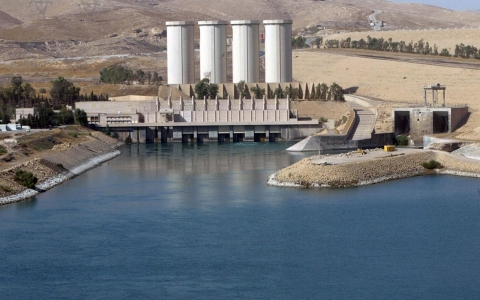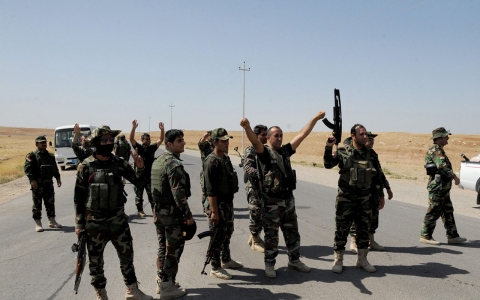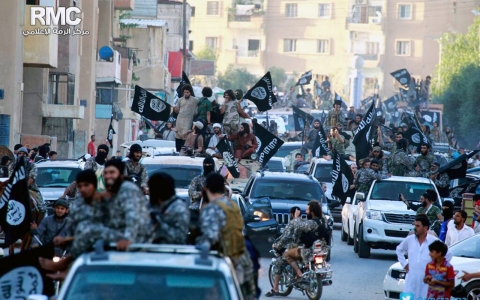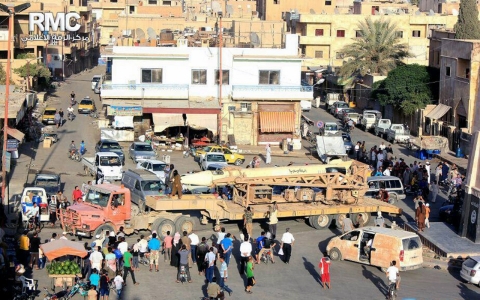President Barack Obama on Thursday authorized the U.S. military to launch targeted airstrikes against Islamic State if the militant group advanced toward American personnel in northern Iraq or a besieged minority group in the region. He also announced that the U.S. military had carried out airdrops of humanitarian aid to the minority group, stranded on a mountaintop with limited food and water.
Speaking from the White House, Obama said the U.S. would "help Iraqis to push back against ISIL," an alternative name for the Islamic State, before cautioning that the action would be limited and not involve ground troops.
"When we have the unique capabilities to help avert a massacre, then I believe the United States of America cannot turn a blind eye," he said. "Today, America is coming to help."
The New York Times previously reported that airstrikes had already taken place, but the Pentagon quickly denied the report. Obama did not confirm whether the U.S. military had already launched attacks against the group.
Shortly before Obama's remarks, the Defense Department confirmed that U.S. military aircraft, at the behest of President Obama, had successfully completed humanitarian airdrops of food and water to thousands of members of Iraq's Kurdish Yazidi religious minority who have been trapped on a mountain in northern Iraq for two days over fears that Islamic State would kill them for their alleged apostasy.
Mohamed Alhakim, Iraq's ambassador to the United Nations, said Thursday that there was "some communication between Baghdad and Washington" on the issue of airstrikes, but none were underway. His comments followed an emergency consultation on Iraq with the U.N. Security Council.
The White House indicated earlier in the day its consideration of dropping humanitarian supplies by air to the displaced religious minorities in northwestern Iraq, possibly in combination with U.S. airstrikes, according to U.S. defense officials and others close to the administration.
The U.S. has a diplomatic consulate in Irbil, capital of Iraq’s Kurdish region, as well as a military operations center that was set up there recently to advise the Iraqi military in the area.
Obama met with his national security team Thursday morning to discuss the crisis as Islamic State made further gains. Airstrikes in particular would mark a significant shift in U.S. strategy in Iraq, where the military fully withdrew in late 2011 after nearly a decade of war.
In recent days, Islamic State militants have swept through villages in the north that are home to religious minorities including Christians and the Yazidis, who follow an ancient religion with ties to Zoroastrianism. Furthering their gains, the extremists seized Iraq's largest dam Thursday, placing them in control of enormous power and water resources and access to the river that runs through the heart of Baghdad.
Islamic State is an Al-Qaeda splinter group that has taken control of numerous cities and major oil fields in Syria and Iraq. It emphasizes a violent expansion of its self-declared Islamic caliphate and the immediate imposition of its radical version of Islamic law wherever it rules.
The U.N. Security Council on Thursday condemned attacks on minorities in Iraq and urged international support for the Iraqi government. The council said that the attacks could constitute crimes against humanity and that those responsible should be held accountable.
"The members of the Security Council also urge all parties to stop human rights violations and abuses and ensure humanitarian access and facilitate the delivery of assistance to those fleeing the violence," said Britain's U.N. Ambassador Mark Lyall Grant, who read from a statement after an emergency consultation requested by France.
The Iraqi government has sought military assistance from the U.S., but Obama has resisted. He has cast any military action as contingent on Iraq reforming its political system to be more inclusive — a step the U.S. hopes would lessen the country's sectarian tension.
Obama has warned that even if the U.S. were to re-engage militarily in Iraq, it would be in a limited fashion and would not involve putting combat troops on the ground. His spokesman reiterated those assurances again on Thursday.
"There are no American military solutions to the problems in Iraq," said Josh Earnest.
Obama did dispatch more than 800 U.S. forces to Iraq this year following Islamic State's gains. More than half are providing security for the U.S. embassy and personnel. American service members are also involved in improving U.S. intelligence, providing security cooperation and conducting assessments of Iraqi capabilities.
With news wires
MAP: Where is the Islamic State operating?

Armed group says it has taken control of the dam and vows to continue marching 'in all directions'

The fighting came as a reported Iraqi government drone strike targeted an Islamic State facility in Mosul

The extremist group has inspired a new generation of radicals in its bid to conquer the region but has taken huge risks

Activists say the Al-Qaeda breakaway group stoned a woman to death for adultery in an incident shrouded in 'mystery'






Error
Sorry, your comment was not saved due to a technical problem. Please try again later or using a different browser.